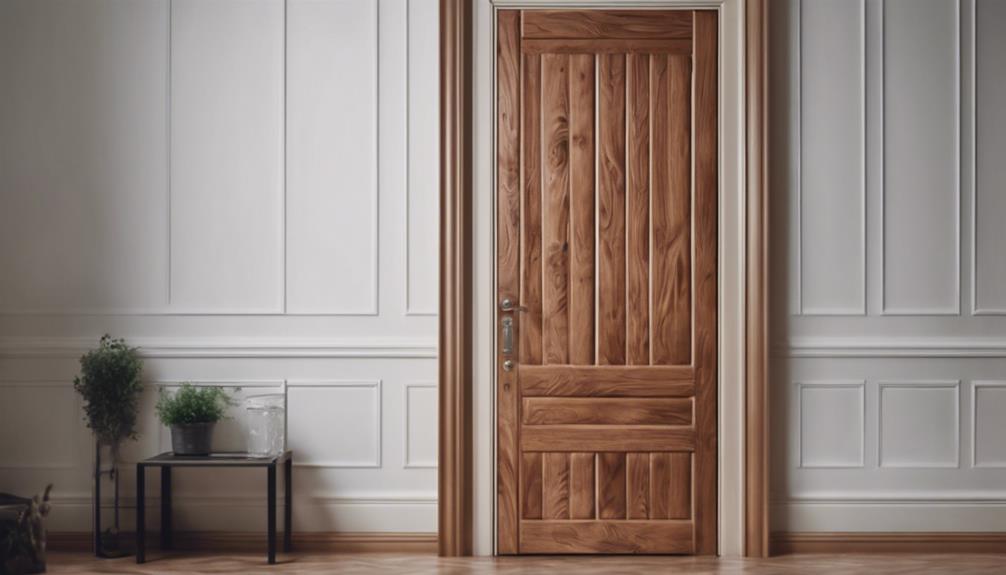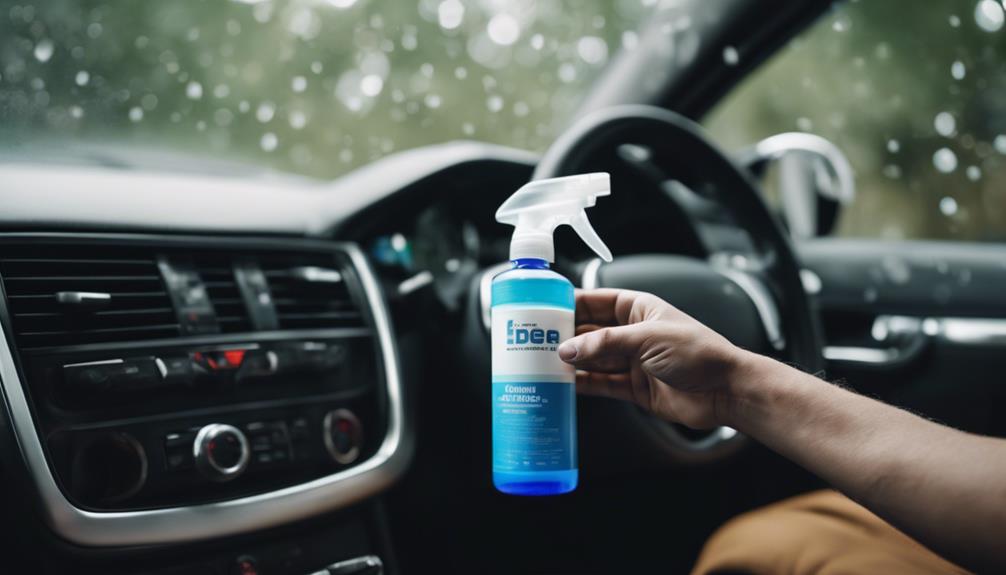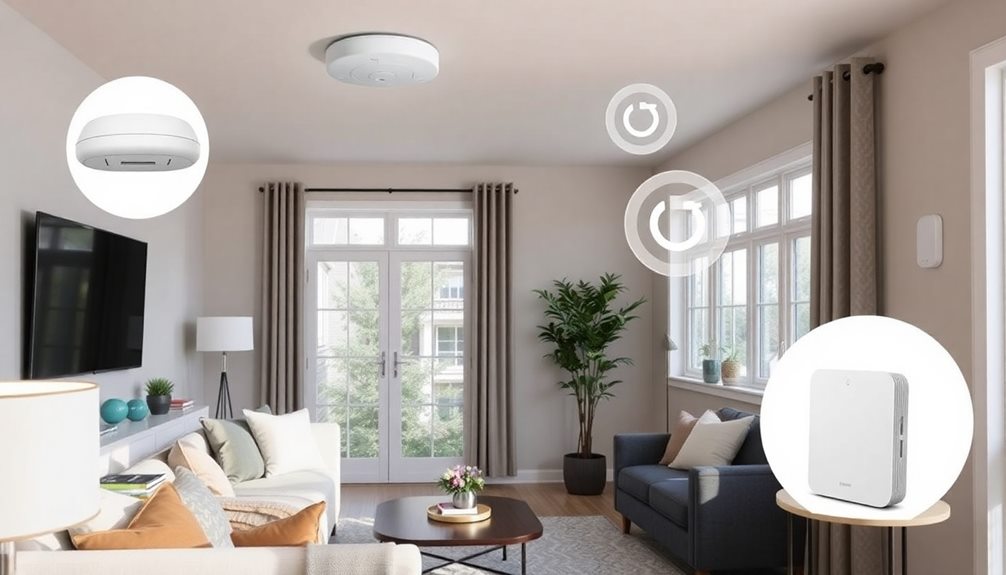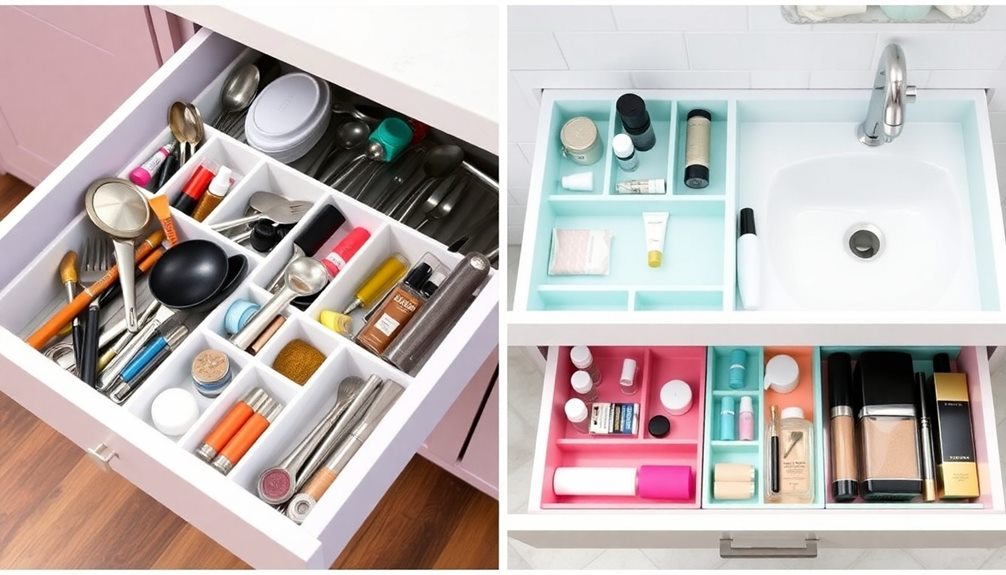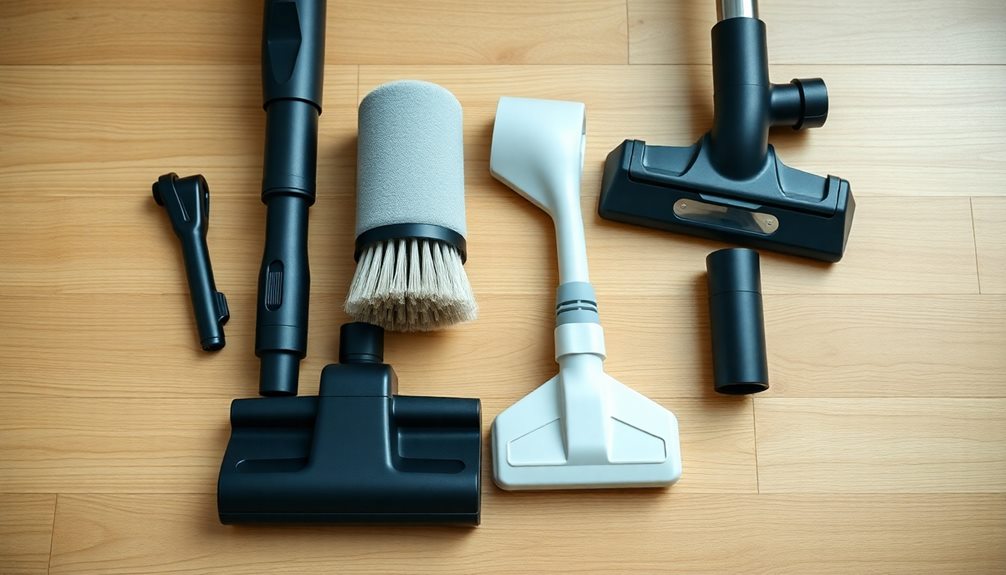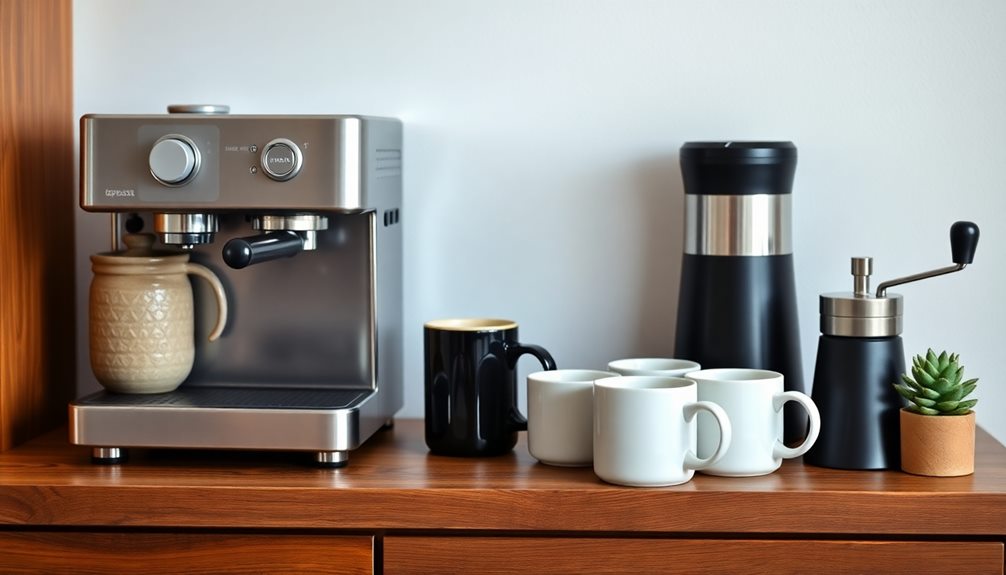Ever wondered why interior doors expand? High humidity levels are the main culprit. When the air is super moist, especially in places like bathrooms, wooden doors soak up that extra moisture like a sponge. This causes the wood to swell up and expand, making your door a tight fit in its frame. By keeping an eye on humidity levels and implementing some maintenance tips, you can prevent excessive door expansion. If you're curious about how to maintain your doors and avoid these issues, there are plenty more helpful tips waiting for you in the detailed research provided.
Key Takeaways
- High humidity levels cause moisture absorption in wooden doors
- Moisture content in the air leads to door expansion
- Monitoring humidity is crucial for preventing excessive expansion
- Proper humidity levels maintenance maintains door fit
- Wooden doors swell due to high humidity and moisture absorption
Factors Contributing to Door Expansion

High humidity levels are the primary factor contributing to the expansion of interior doors, especially wooden ones. When moisture from the air is absorbed by wooden doors, they tend to swell in size, causing potential issues with their fit within door frames.
This moisture absorption occurs most prominently in environments with high humidity levels, such as bathrooms, where the air is often laden with moisture. As the humidity levels rise, so does the likelihood of your interior doors expanding. The moisture content in the air plays a vital role in this expansion process, as wooden doors are particularly susceptible to changes in humidity.
Hence, it's essential to monitor the humidity levels in your home, especially in areas prone to high moisture, to prevent excessive expansion of your interior doors. By keeping an eye on the humidity levels, you can help maintain the proper fit of your doors within their frames and ensure they function smoothly.
Impact of Moisture on Door Swelling
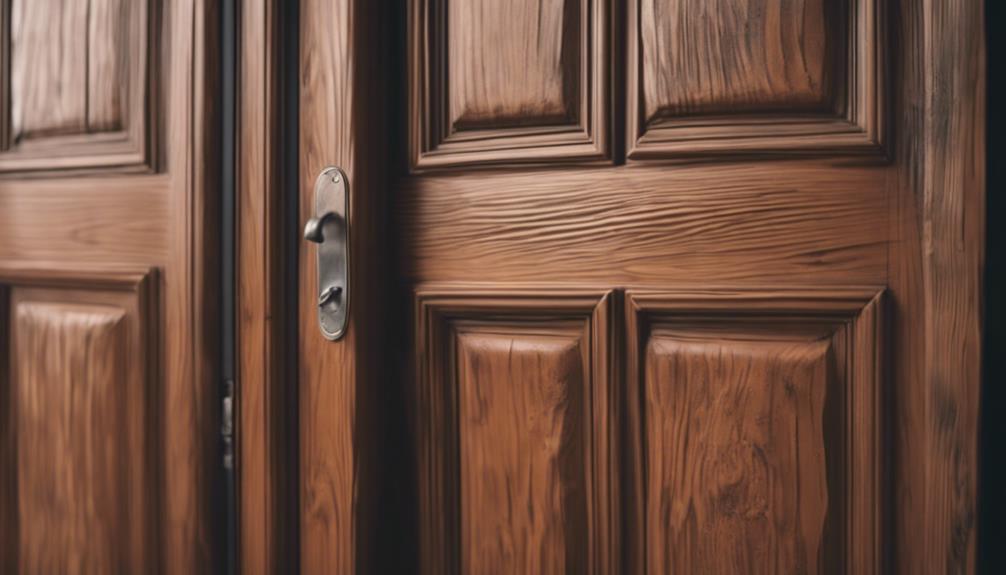
Moisture absorption in wooden doors leads to swelling, especially in humid environments where there's a high amount of moisture in the air. When wooden doors absorb moisture, they tend to expand, causing them to become tight in their frames or even stick when opening or closing. High humidity levels inside a home can greatly contribute to interior door expansion as the doors absorb moisture from the surrounding air. Additionally, activities like taking hot showers in a bathroom can increase the humidity levels in that area, further impacting interior doors and causing them to swell over time.
To prevent or minimize the impact of moisture on interior door swelling, it's crucial to make sure that the doors are properly sealed and maintained. This can help create a barrier that reduces the amount of moisture the doors absorb, ultimately limiting the extent of swelling that may occur. Regular maintenance and monitoring of humidity levels can go a long way in preserving the quality and functionality of wooden doors in your home.
Influence of Temperature on Door Expansion
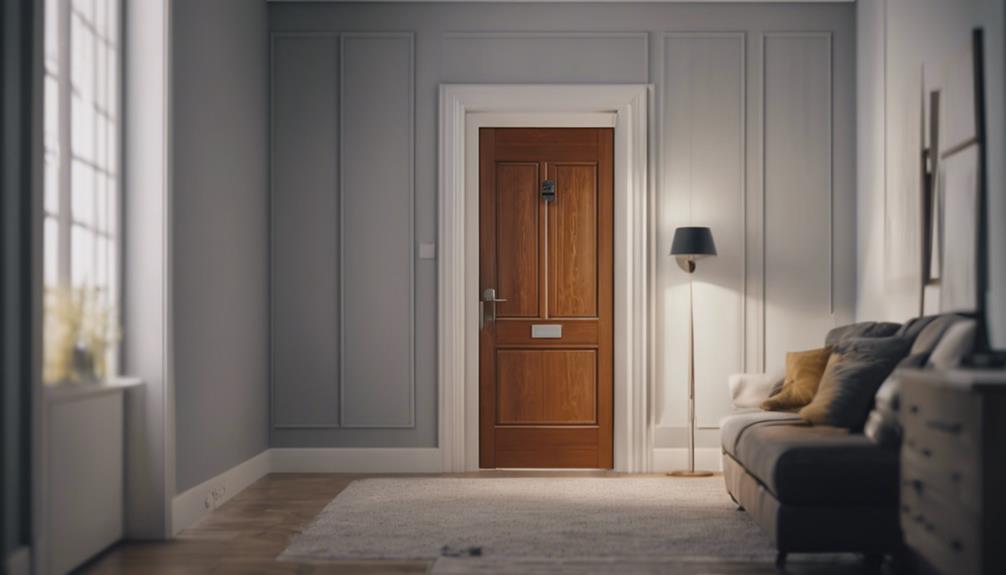
Did you know that the temperature in your home can actually impact the size of your interior doors?
When it's warm, wood absorbs moisture from the air, causing doors to expand.
Conversely, cooler temperatures can make the wood contract, affecting the overall dimensions of the door.
Temperature Affects Door Size
Temperature fluctuations play a significant role in causing interior wooden doors to expand and contract, directly impacting their size. When temperatures rise, wooden doors tend to absorb moisture from the air, leading to expansion. Conversely, as temperatures drop, doors release moisture and contract, affecting their overall dimensions. Properly sealed and finished doors can help minimize the effects of temperature changes on door size. Understanding how temperature affects door size is essential for maintaining the integrity of interior doors in various climate conditions.
| Temperature Affects Door Size | |
|---|---|
| Impact | Causes expansion and contraction |
| Moisture Absorption | Increases door size in warm temperatures |
| Moisture Release | Decreases door size in cool temperatures |
| Mitigation | Proper sealing and finishing techniques |
Humidity Causes Door Swelling
Humidity, along with temperature fluctuations, plays a significant role in causing interior doors to swell as wood absorbs moisture from the air. Changes in temperature, especially warm conditions, can lead to wood swelling, impacting the size of doors.
High humidity levels within a home are a key factor in the expansion of interior doors, affecting their fit and operation. Bathroom humidity, in particular, can contribute to door swelling due to the moisture present in the air.
Understanding that wood expands in warm temperatures and contracts in cooler ones is essential in grasping the reasons behind interior door swelling. By managing humidity levels and being mindful of temperature changes, you can help mitigate the effects of door expansion in your home.
Materials React to Heat
When exposed to varying temperatures, the materials in interior doors undergo changes that cause them to expand, influencing their size and fit within the door frame. Heat can trigger these reactions, leading to wooden doors swelling and potentially affecting their functionality.
Fluctuations in temperature play a significant role in door swelling, as the materials within the door respond to the heat by expanding. This expansion can result in doors sticking or not closing properly, impacting their overall performance.
Understanding how temperature affects interior doors is important for addressing issues related to expansion and ensuring that doors function correctly. By being aware of how materials react to heat, you can better manage door swelling and maintain the ideal fit of your interior doors within the door frame.
Role of Humidity in Door Swelling

Absorbing moisture from the air, wooden interior doors are susceptible to swelling due to high humidity levels within a home. When humidity levels rise, especially in areas like bathrooms where hot showers generate steam, the air is laden with moisture. This excess moisture is absorbed by the wooden doors, causing them to expand and potentially leading to issues with opening and closing smoothly.
Humidity plays a significant role in the swelling of interior doors. It's important to be mindful of the humidity levels in your home, as high humidity can result in increased moisture absorption by the doors. In turn, this moisture absorption causes the doors to swell, affecting their functionality. To prevent this from happening, consider implementing measures to reduce humidity levels, such as using dehumidifiers or ensuring proper ventilation in areas prone to high moisture content.
Effects of Warm Environments on Doors

Warm environments can lead to wooden doors absorbing moisture from the air, causing them to expand and potentially affect their functionality. Here are some effects of warm environments on doors:
- Increased Humidity Levels: In warm environments, the humidity levels rise, contributing to the swelling of interior doors as they absorb moisture from the air.
- High Temperatures Impact: The heat in warm environments can trigger the wood in interior doors to expand, altering their size and fit over time.
- Bathroom Humidity: Particularly in bathrooms where hot showers are taken, the humidity levels can rise significantly, affecting the size of interior doors due to the increased moisture content in the air.
These factors combined can lead to the expansion and contraction of wooden doors in warm environments, potentially causing doors to stick or become challenging to close properly. Understanding these effects can help you take preventive measures to maintain your interior doors in peak condition.
Consequences of Cool Temperatures on Doors

Cool temperatures can cause interior doors to contract and shrink, potentially leading to gaps between the door and the frame. When doors shrink in cool weather, they may become misaligned, causing issues with hinges and making it challenging to open or close them smoothly. This contraction can also affect the appearance and functionality of wooden doors, making them prone to warping. Moreover, as interior doors contract and create gaps, they can introduce drafts into your home, reducing energy efficiency.
To combat the consequences of cool temperatures on doors, it's essential to ensure proper insulation and sealing. By fixing a swollen door promptly and addressing any gaps that may have formed, you can improve the energy efficiency of your home. Maintaining your doors in good condition not only enhances the aesthetics of your living space but also helps in keeping your home comfortable and energy-efficient.
Bathroom Humidity and Door Swelling

When exposed to high humidity levels in bathrooms, wooden interior doors can absorb moisture and swell, impacting their fit and functionality. To address this issue, follow these steps:
- Inspect the Door: Regularly check your bathroom door for signs of swelling. Look for tight spots where the door rubs against the frame or floor, making it difficult to open and close smoothly.
- Monitor Swelling: Keep an eye on how the door fits within the frame. If you notice any changes in how the door opens or closes, it may be a sign of swelling due to bathroom humidity.
- Address the Issue: If you observe swelling in your interior door, consider adjusting the hinges or sanding down the affected areas to improve the fit. Additionally, installing a dehumidifier in your bathroom can help control moisture levels and prevent further swelling.
Preventing Sticking and Difficulty in Opening
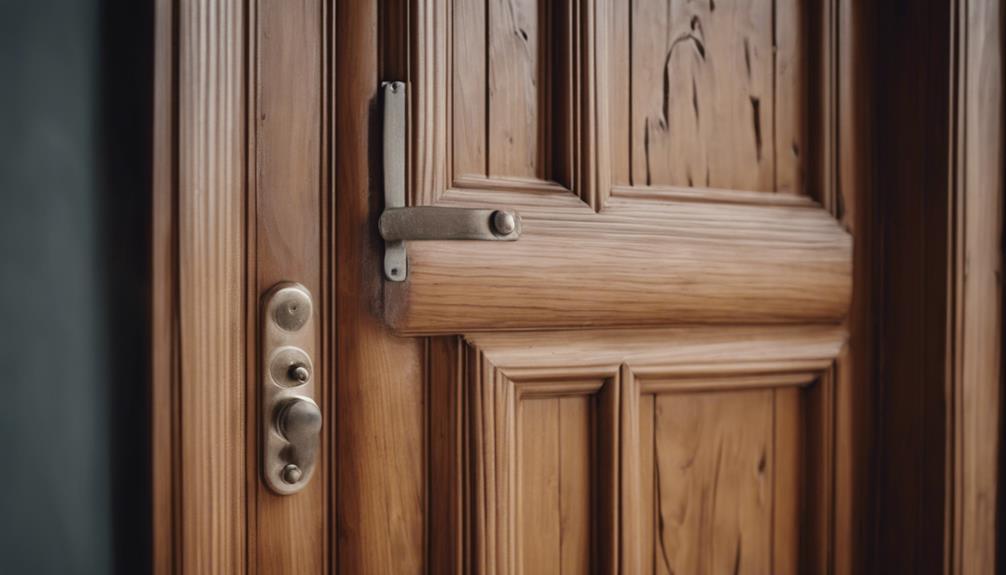
Did you know that humidity can actually change the size of your interior doors?
To prevent those pesky sticking issues, make sure your doors are properly sealed and maintain your home's humidity levels.
Humidity Affects Door Size
To prevent sticking and difficulty in opening, it's essential to understand how humidity affects the size of interior doors. Here's how humidity influences your doors:
- Absorption of Moisture: High humidity levels can cause wooden interior doors to absorb moisture, leading to swelling and expansion.
- Source of Moisture: Bathrooms and kitchens are common sources of moisture that contribute to interior door swelling.
- Natural Wood Behavior: Wood naturally expands in warm, humid conditions, making interior doors more prone to swelling in such environments.
Proper Sealing Prevents
Properly sealing your interior doors is essential to prevent sticking and difficulty in opening, ensuring their longevity and smooth operation. When you seal your interior doors effectively, you create a protective barrier that prevents moisture absorption, a major cause of door expansion.
By reducing the impact of humidity changes, the stability of wooden doors is maintained, minimizing the risk of swelling and warping. Well-sealed interior doors are less likely to stick or become hard to open due to moisture-induced expansion.
Investing in quality sealing materials and techniques can greatly prolong the lifespan of your interior doors. So, take the time to properly seal your doors to keep them functioning smoothly and looking great for years to come.
Regular Maintenance Ensures
Regular maintenance checks, including inspecting for cracks or splits, play a crucial role in preventing interior doors from expanding and causing sticking or difficulty in opening. To guarantee your doors function smoothly, follow these tips:
- Check for Cracks: Regularly inspect your doors for any cracks or splits that could lead to expansion.
- Properly Seal Doors: Make sure that your doors are properly sealed and have weatherstripping to prevent swelling due to humidity.
- Adjust Hinges: If you notice any misalignment, adjust the hinges as needed to keep your doors from expanding.
Importance of Proper Maintenance for Doors

Maintaining interior doors is essential to prevent issues like swelling, warping, and sticking. By conducting regular maintenance checks, you can catch early signs of swelling and address them promptly, saving you time and money in the long run. Here's a handy table outlining some key maintenance tips for keeping your interior doors in top condition:
| Maintenance Tip | Description |
|---|---|
| Regular Inspections | Check for any signs of swelling, warping, or sticking. |
| Control Humidity Levels | Maintain low humidity to prevent doors from expanding. |
| Apply Water-Resistant Finish | Protect wooden doors from moisture-related swelling. |
| Ensure Proper Sealing and Hinge Alignment | Prevent expansion by keeping hinges well-aligned and sealed. |
Following these simple maintenance tips can help preserve the integrity of your interior doors and make sure they function smoothly for years to come.
Frequently Asked Questions
How Do I Stop My Internal Doors From Expanding?
To stop your internal doors from expanding, control the indoor humidity levels. Use a dehumidifier to reduce excess moisture in the air that causes the wood to swell. Keep your home well-ventilated to prevent humidity buildup. Consider weather-stripping around the door to minimize exposure to moisture.
Regularly inspect and maintain your doors to catch any issues early. By managing humidity and maintaining your doors, you can prevent them from expanding.
Do Swollen Doors Go Back to Normal?
If your swollen doors are causing concern, worry not! Over time, wood naturally expands and contracts, so those doors can indeed return to normal.
Inspect for cracks, adjust hinges, or consider replacement to restore your doors to their original shape. Contacting professionals like Window City Pros can also help enhance your home's appearance.
Take advantage of offers like free installation to efficiently address any swollen door issues you may have.
What Causes Internal Doors to Swell?
When warm temperatures embrace your home, wooden interior doors tend to expand, absorbing moisture and swelling up. This cozy environment, coupled with high humidity levels, can cause your doors to grow in size.
Even the steam from your relaxing shower can play a role in this expansion. But fear not, as once the temperatures cool down, the wood contracts, bringing the doors back to their normal size.
Do Doors Swell in Winter or Summer?
Doors can swell in both winter and summer due to temperature and humidity changes. In winter, indoor heating can dry out the air, causing wooden doors to contract.
Conversely, in summer, high humidity levels can lead to door swelling. Fluctuations in temperature affect wood moisture content, causing expansion or contraction.
Proper ventilation and humidity control are key to preventing these issues. Understanding your home's environment can help address door expansion effectively.
Conclusion
So, next time you notice your interior doors expanding, remember that moisture, temperature, and humidity all play a role in this common occurrence.
By understanding the factors at play and taking steps to prevent sticking and difficulty in opening, you can guarantee your doors stay in top shape.
Proper maintenance is key to keeping your doors functioning smoothly and looking great.
Keep these tips in mind to avoid any door-drama in your home!
